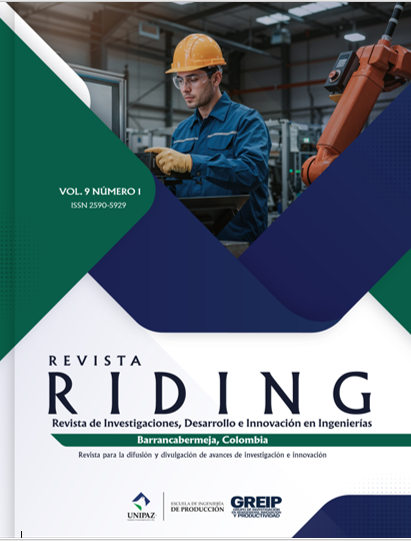Use of cassava starch as the main material in the development of a product for plastering
Keywords:
Almidón de yuca, Estuco, Biocompuesto, Sostenibilidad, Durabilidad.Abstract
This article explores the feasibility of using cassava starch as the main material in stucco products to reduce the environmental impact of construction by utilizing renewable resources. Through an exploratory and experimental approach, a biocomposite stucco was created with a composition of 70% cassava starch and 30% lime, cement, and gypsum. A comparative analysis of drying time was conducted using one-way ANOVA to identify significant differences in drying times. While some results were unfavorable, others indicated that cassava starch could be a viable main component in stuccos, promoting more sustainable mixtures. The study demonstrates that cassava starch has the potential to enhance the durability and strength of stuccos, similar to its application in cement mortars and other construction sectors, such as in oilfield operations and wood adhesives.
References
F. O. Okafor, "The performance of cassava flour as a water-reducing admixture for concrete," Niger. J. Technol., vol. 29, no. 2, pp. 106–112, 2010.
B. Ghanbarradeh and H. Almasi, Biodegradable Polymers. Croatia: IntechOpen, 2016, pp. 141–186.
M. Tsko et al., "The principles of starch gelatinization and retrogradation," Food Nutr. Sci., vol. 5, no. 3, pp. 280–291, 2014.
ASTM C136/C136M-19, Standard Test Method for Sieve Analysis of Fine and Coarse Aggregates. West Conshohocken, PA: ASTM International, 2019.
BS EN 1015-3, Methods of Test for Mortar for Masonry: Determination of Consistence of Fresh Mortar. London, UK: BSI, 1999.
S. K. Joseph and A. Sonia-Xavier, "Effect of starch admixtures on fresh and hardened properties of concrete," Int. J. Sci. Eng. Res., vol. 4, no. 3, pp. 27–30, 2013.
J. Pittoda and P. S. Umrigar, "Evaluation of sorptivity and water absorption of concrete with partial replacement of cement by thermal industry waste (fly ash)," Int. J. Eng. Innov. Technol., vol. 2, no. 7, pp. 245–249, 2013.
F.O. Okafor, The performance of cassava flour as a water-reducing admixture for concrete, Niger. J. Technol., vol. 29, no. 2, pp. 106–112, 2010.
A.A. Akhdanhuni and W. Schmidt, Effect of cassava starch on shrinkage characteristics of concrete, Afr. J. Sci. Technol. Innov. Dev., vol. 61, no. 1, 2019.
ASTM C53, Standard Specification for Concrete Aggregates, ASTM International, West Conshohocken, PA, 2020.
BS EN 197-1, Cement Part 1: Composition, Specifications and Conformity Criteria for Common Cements, British Standards Institution, London, UK, 2011.
A.A. Akhdanhuni and H.C. Uzoeppo, Strength and durability properties of concrete with starch admixture, Int. J. Concr. Struct. Mater., vol. 12, no. 1, 2018.
BS EN 8500-2, Concrete Complementary British Standards to BS EN 206: Constituents Materials and Concrete, British Standards Institution, London, UK, 2013.
D. O. Oni, J. Mverso, and C. Kabubo, "Experimental investigation of the physical and mechanical properties of cassava starch modified concrete," Open Constr. Build. Technol. J., vol. 13, no. 1, pp. 351–345, 2019.
A. E. Abalska, Comparative Effects of Cassava Starch and Simple Sugar in Cement Mortar and Concrete, 2020. [Online]. Available: http://www.ajol.info/index.php/atbu/article/view/85748
M. Tsko et al., "The principles of starch gelatinization and retrogradation," Food Nutr. Sci., vol. 5, no. 3, pp. 280–291, 2014
Downloads
Published
Issue
Section
License

Este obra está bajo una licencia de Creative Commons Reconocimiento-NoComercial-CompartirIgual 3.0 Unported.


